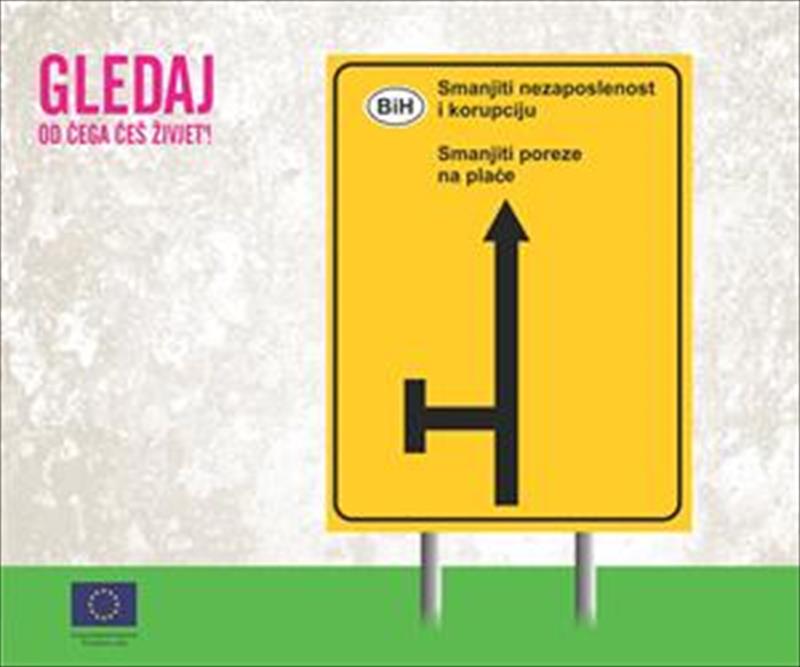Economic transition is still underway in Bosnia and Herzegovina. Unfortunately, after nearly two decades of moving towards a liberalised free-market and capital-driven business model, the economy still shows signs of weakness. After the dismantling of large state-owned enterprises and a series of unsuccessful privatisations, the economy is characterised by small companies, a weak private sector and seemingly low attractiveness for foreign investors. BiH is ranked 131st in the World Bank’s annual “Ease of Doing Business” survey, the lowest of all the countries in the region. Furthermore, youth comprise only 12.7% of the workforce in BiH with youth unemployment running as high as 59%. Moreover, in international comparisons, BiH has one of the highest rates of payments for social contributions (71%). Hence, reforming the labour market and restructuring the tax burden on employment are two of the main socio-economic challenges facing the country. “This must be improved,” said Ambassador Peter Sorensen, EU Special Representative and Head of the Delegation of the European Union to BiH, following the Forum for Prosperity and Jobs held in BiH in May 2014. He emphasised that discussion at the Forum had “stressed the need for the authorities to increase competitiveness by approving a results-based plan, aimed at improving indicators such as Doing Business rankings to match the regional average.”
Technical experts and representatives of trade unions, employers and civil society sought fundamental and urgent solutions to these challenges at the workshop on Labour Market and Tax Burden on Employment, organized by the International Monetary Fund during the Forum for Prosperity and Jobs.
Workshop participants agreed that the slow pace of Bosnia and Herzegovina’s transition to a market economy, the lack of strategic reforms, a challenging business climate and continuing political uncertainty have all deterred investors and hampered the creation of new jobs. Among the factors responsible for the underperformance of the BiH labour market, participants cited labour market rigidities that discourage hiring, out-dated labour laws that make it difficult to dismiss unproductive workers, the prevalence of the grey economy, low salaries (that can be twinned with low productivity), a high tax burden, and a cumbersome and expensive public administration.
Deep-rooted corruption is also an obstacle to sustainable development in BiH, as well as one of the main obstacles to investment, economic progress and European integration. Corruption is therefore a major socio-economic challenge that all segments of BiH society must unite against and tackle.
“Corruption kills initiative and investment in Bosnia and Herzegovina’s economy. Fighting corruption will require strengthening adherence to the rule of law – police, prosecutors and judges – and deep public administration reform,” stressed Ambassador Sorensen.
The country’s complicated legal and institutional structure, with a high incidence of para-fiscal taxes and regulations that lack transparency, has created an environment where corruption can thrive.
An additional problem is that many individuals and businesses find it simpler to accept corruption – to view it as part of life and a necessary “cost of doing business”. However, a full 40% of the respondents to Transparency International’s survey ranked corruption as a major obstacle to sustainable development.
Jean-Eric Paquet, Director for Albania, BiH, Serbia and Kosovo* in the European Commission’s Directorate-General for Enlargement, noted that, according to the Transparency International Corruption Perceptions Index, BiH is the lowest ranked of all the ex-Yugoslavian countries.
“In this region, corruption is ranked as the third largest obstacle to business and investment, since it increases the unpredictable cost of doing business,” Mr Paquet said in the Forum’s workshop report. “Additionally, it is the major obstacle to FDI and diaspora investment. Thus around 5.5% of investors decided not to make a major investment in the past year due to the bribes necessary to obtain different permits.”
Anti-corruption measures supported in the Forum’s workshop report include a call for a review of the Anti-Corruption Strategy to be carried out in collaboration with all stakeholders (institutions, civil society, academia, and media). The Strategy should promote a holistic approach: prevention, repression and identification of priorities, particularly in the field of enforcement. It was also proposed that the International Community cooperate with stakeholders (such as the Foreign Investors’ Council) to undertake a comprehensive mapping of para-fiscal fees and other costs and permits in order to increase transparency. Mapping should be made public to ensure transparency of the process and results.


